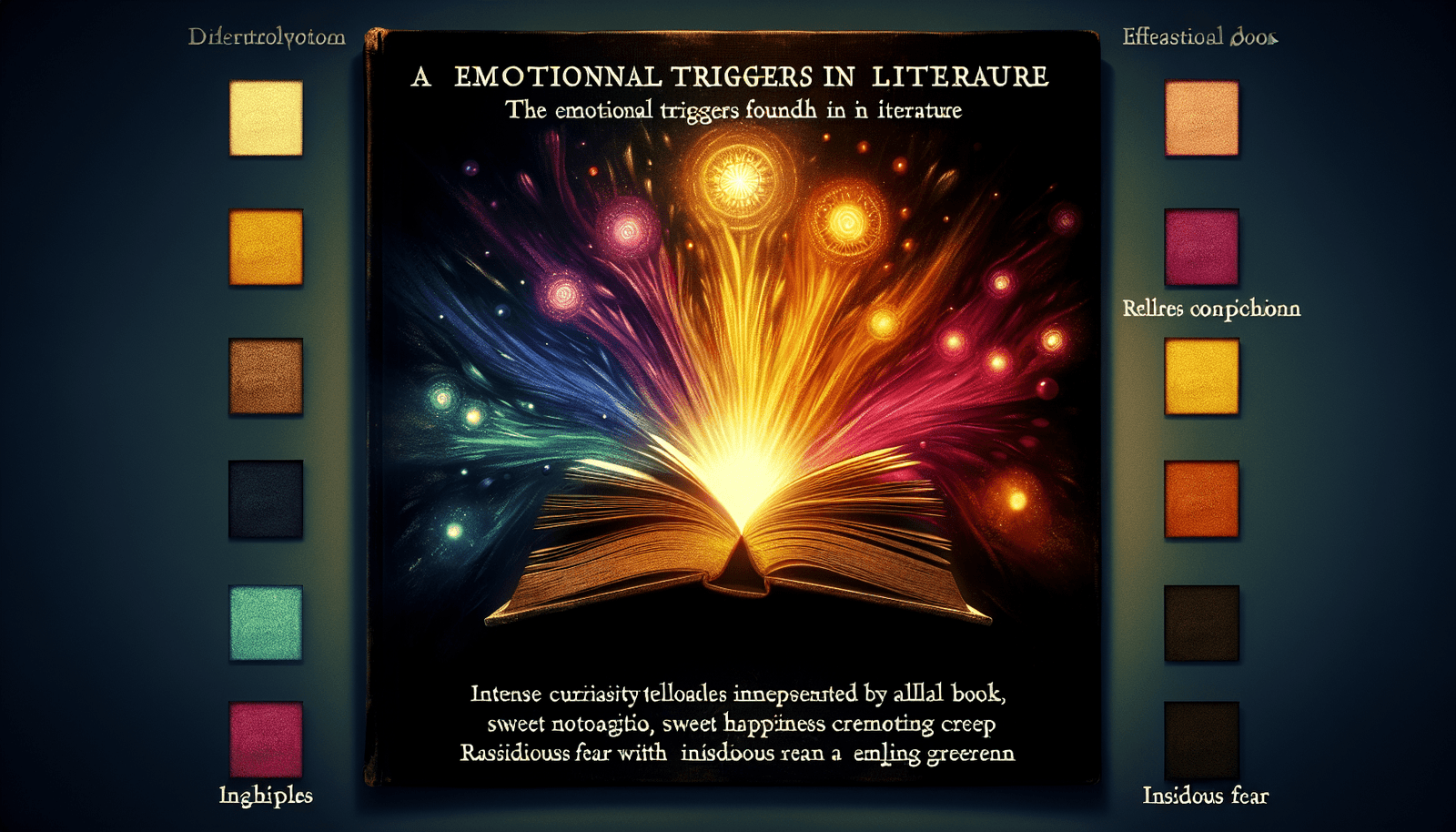In the world of literature, a compelling book title can make all the difference in catching a reader’s eye. “How Can Emotional Triggers In Book Titles Captivate Your Readers Instantly?” explores the powerful impact of emotion-laden words in crafting irresistible book titles. By tapping into your readers’ subconscious feelings, the right title can evoke curiosity, empathy, excitement, or even nostalgia, making your book an unmissable read. This article delves into the psychology behind emotional triggers and offers practical tips to create titles that immediately engage and resonate with your audience.
How Can Emotional Triggers In Book Titles Captivate Your Readers Instantly?
Have you ever picked up a book solely based on its title? Think about it—what made you choose that particular book over countless others? Chances are, it wasn’t just the cover art or a hunch; it was the emotional trigger embedded within the title that spoke directly to you.
Understanding Emotional Triggers
emotional triggers are psychological stimuli that evoke a strong emotional response. In the context of book titles, these triggers can make someone feel curious, nostalgic, happy, or even anxious. When you understand how these emotional triggers work, you can craft book titles that hook readers instantly.
The Psychology Behind Emotional Triggers
Why do certain words trigger emotions more effectively than others? It boils down to how our brains process emotional and cognitive stimuli. Words that evoke vivid images, memories, or feelings tap into the amygdala, the brain’s emotional processing center. This kind of connection is immediate and powerful, making potential readers feel compelled to explore your book further.
Types of Emotional Triggers
What kinds of emotions can you tap into with your book title? Below is a table that outlines various emotional triggers and examples of words that can evoke these emotions.
| Emotion | Trigger Words & Phrases |
|---|---|
| Curiosity | Secret, Unveiled, Mystery, Uncovered |
| Nostalgia | Childhood, Yesteryear, Remembrance, Memory |
| Happiness | Joyful, Bliss, Celebrate, Radiant |
| Fear/Anxiety | Dangerous, Hidden, Forbidden, Frightening |
| Surprise | Unexpected, Sudden, Astonishing, Shocking |
| Love/Romance | Heartfelt, Passionate, Affair, Enamored |
| Sadness | Tragic, Loss, Mournful, Heartbroken |
Crafting Book Titles That Evoke Emotion
So, how do you go about creating a title that tugs at the heartstrings or piques curiosity? Here are some guidelines to help you get started.
Understand Your Target Audience
To create a compelling title, you need to know who you’re speaking to. Are your readers young adults, professionals, or retirees? What are their interests, fears, and hopes? This information will influence your choice of words and the emotional triggers you decide to use.
Focus on Strong, Evocative Words
Words have power. Choose terms that are strong and evocative. Instead of using a bland word like “happy,” opt for something like “joyful” or “radiant” to create a more profound emotional impact.
Use Sensory Language
Engage your readers’ senses by incorporating sight, sound, taste, touch, and smell into your title. A sensory experience becomes more vivid and memorable, making your book stand out.
Incorporate Themes & Genres
The theme and genre of your book should influence your title. If you’re writing a mystery novel, words that evoke curiosity or fear might be most effective. On the other hand, a romance novel could benefit from words that evoke love and longing.
Experiment with Structure
Don’t be afraid to play around with the structure of your title. You can use questions, incomplete sentences, or even unusual word combinations to intrigue potential readers.
Test Different Versions
Before settling on a title, test out a few options with your target audience. Gather feedback to see which titles resonate most and why. This process can provide invaluable insights into what works and what doesn’t.
Case Studies: Successful Emotional Triggers in Book Titles
To better understand how emotional triggers work in book titles, let’s take a look at some successful examples.
Case Study 1: “To Kill a Mockingbird” by Harper Lee
This title instantly evokes a sense of innocence disrupted. The word “kill” juxtaposed with “mockingbird,” a symbol of innocence, creates a strong emotional impact. It stirs curiosity, sadness, and a sense of injustice, compelling the reader to dive into the story.
Case Study 2: “Eat, Pray, Love” by Elizabeth Gilbert
The simplicity and rhythm of this title evoke a sense of universal human experiences. “Eat” triggers sensory pleasures, “pray” evokes spirituality, and “love” brings to mind deep emotional connections. Each word taps into a fundamental human experience, captivating a broad audience.
Case Study 3: “The Girl on the Train” by Paula Hawkins
This title stirs curiosity and suspense. The phrase “The Girl” implies a central character with an air of mystery, while “on the Train” evokes a sense of journey and transit, suggesting movement and change. Readers are instantly intrigued to know more about this girl and her journey.
Case Study 4: “The Catcher in the Rye” by J.D. Salinger
The title leaves readers puzzled yet intrigued. The word “catcher” paired with “rye” doesn’t immediately make sense, stirring curiosity. As one reads the book, the title gains depth and meaning, making it memorable and impactful.
Common Mistakes to Avoid
While crafting an emotionally engaging book title, you’ll want to steer clear of these common pitfalls.
Overcomplication
Complex titles can confuse and deter potential readers. Keep it simple but impactful. Aim for clarity without sacrificing emotional depth.
Clichés and Overused Phrases
Avoid clichés and overly familiar phrases that can make your book title blend into the crowd. Strive for originality and freshness to capture attention.
Mismatch with Content
Ensure that your emotionally charged title aligns with the book’s actual content. Misleading titles can lead to reader disappointment and negative reviews.
Lack of Emotional Resonance
A title that fails to evoke any emotional response will likely be overlooked. Make sure your chosen words resonate emotionally with your target audience.
Strategies for Testing Your Titles
How do you know if your title will resonate with readers? Here are some strategies for testing its effectiveness:
A/B Testing
Create multiple versions of your title and test them in different settings—social media, email newsletters, or online polls. Analyze the engagement levels to see which title performs best.
Focus Groups
Gather a small group of people from your target audience and present them with different title options. Discuss their impressions and preferences to gain insights into which title resonates most.
Online Surveys
Launch short online surveys asking participants to choose between different title options. Include open-ended questions to gather qualitative feedback on why they preferred one title over another.
Social Media Polls
Utilize your social media channels to run quick polls. This is an effective way to reach a larger segment of your audience and gather immediate feedback.
Practical Tips for Crafting Your Book Title
Here are some practical tips to help you craft a captivating and emotionally charged book title.
Make It Memorable
Your title should be easy to remember. Think of catchy phrases or unique word combinations that stick in the reader’s mind.
Keep It Relevant
Ensure the title is relevant to the book’s content and theme. A relevant title creates a promise that the reader expects to be fulfilled.
Stay True to Your Voice
Your title should reflect the tone and style of your writing. If your book is humorous, let that shine through in the title. If it’s a dark thriller, the title should evoke a sense of suspense.
Be Flexible
Don’t get too attached to your first idea. Be willing to revise and refine your title until it feels just right. It may take several iterations to find the perfect fit.
Consult with Others
Don’t be shy about seeking feedback from friends, family, or writing groups. They can offer fresh perspectives and valuable insights you might not have considered.
Monitor Trends
Stay updated on current trends in your genre. While you want to be original, understanding what’s resonating with readers at the moment can provide helpful direction.
Final Thoughts
Crafting a book title with emotional triggers can truly captivate readers instantly and make your book stand out. By understanding your target audience, using evocative language, and testing different options, you can create a title that not only piques interest but also resonates on a deep emotional level.
Remember, a great title is your book’s first impression, and making it count can be the difference between a potential reader skimming past or diving into your story. So take your time, experiment, and watch as your thoughtfully crafted title draws readers in from the very first glance.



